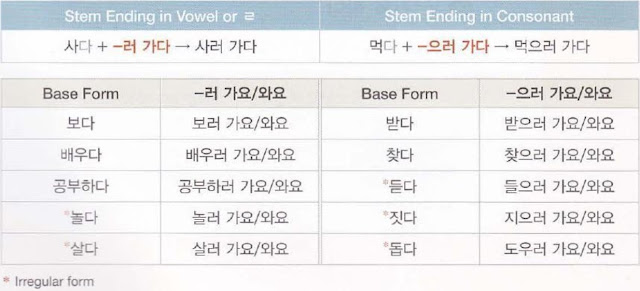 옷을 사러 동대문 시장에 가요.
옷을 사러 동대문 시장에 가요.
We’re going to Dongdaemun Market to buy clothes.
한국 팬들을 만나러 한국에 왔어요.
I came to Korea to see my Korean fans.
은행에 돈을 찾으러 가요.
I’m going to the bank to withdraw some money.
Grammar Focus:
-(으)러 가다/오다 expresses going or coming to a place to perform an action, with the action stated first and the place second. It corresponds to ‘(in order) to’ in English. When the verb stem ends in a vowel or ㄹ, then -러 가다/오다 is used, and when it ends in a consonant, -(으)러 가다/오다 is used.
 Only movement verbs such as 가다 (to go), 오다 (to come), and 다니다 (to attend/commute) are used after -(으)러.
Only movement verbs such as 가다 (to go), 오다 (to come), and 다니다 (to attend/commute) are used after -(으)러.
• 옷을 사러 시장에 가요. (〇). (I) go to the market to buy clothes.
• 옷을 사러 돈을 찾아요. (X)
->옷을 사려고 돈을 찾아요. (〇) (I) withdrew money to buy clothes.
Furthermore, the following verbs that express movement cannot be used before -(으)러: 가다(to go); 오다 (to come), 올라가다 (to go up), 내려가다 (to go down), 들어가다 (to enter), 나가다 (to leave), 여행하다 (to travel), and 이사하다 (to move/change residences).
• 가러 가다 (X), 오러 가다 (X), 올라가러 가다 (X), 나가러 가다 (X)
Conversation:
A: 이사했어요? Did you move (change residences)?
B: 네, 지난 주에 했어요. 주말에 우리 집에 놀러 오세요.
Did you move (change residences)?
A: 요즘 바빠요? Are you busy these days?
B: 네, 조금 바빠요. 한국 춤을 배우러 학원에 다녀요.
Yes, I’m a bit busy. I’m attending an academy to learn Korean dance.
